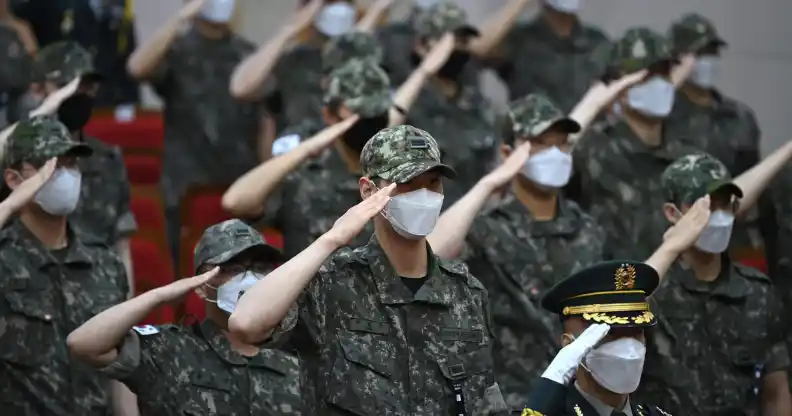South Korean court rules consensual sex between two male soldiers ‘bordered on rape’

Because of a military ban on gay sex, the two male solders were considered by the court to have “molested” each other by having consensual oral sex. (AFP via Getty/ Jung Yeon-je)
A military court in South Korea has prosecuted two male soldiers, insisting that their consensual sex “bordered on rape”.
The two men were handed a six-month suspended prison sentence, according to The Guardian, after being found guilty of “indecency”.
Although same-sex sexual activity is legal for civilians in South Korea, it is banned under article 92-6 of the country’s military penal code. For military personnel, it is considered “sexual harassment”, and is punishable with up to two years in prison.
In South Korea, it is compulsory for all men in the country to serve a minimum of 21 months in the military.
According to the ruling, one of the male soldier’s entered the other’s tent on multiple occasions in December 2020, when they were in a group that was isolating because of the pandemic, and they engaged in oral sex.
Because of the military ban on gay sex, they were considered by the court to have “molested” each other.
Despite their defence lawyer arguing that the sex between the two men was consensual, the court insisted it was “considered contrary to good sexual morality” and even “bordered on rape”.
Kim Hyung-nam, director of the Center for Military Human Rights Korea, told The Guardian that the ruling was “undeniable discrimination against sexual minorities”.
He added: “Article 92-6 preservationists say the military will suffer damages due to the collapse of military discipline, but it’s difficult to see how same-sex sexual relations under mutual consent inflict such damage.”
In 2019, Amnesty International released a report titled “Serving in Silence: LGBTI people in South Korea’s military”.
The report showed that while LGBT+ people are becoming “increasingly visible” in South Korea, soldiers are facing “harassment, discrimination and violence at the hands of their commanding officers and their peers”.
Anonymous South Korean soldiers who were interviewed for the research reported being questioned about their sexuality before their military service, and other said if they were “considered feminine”, they were subjected to physical and sexual abuse by higher ranking officers.

